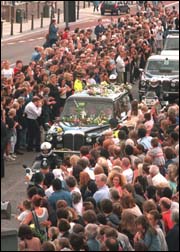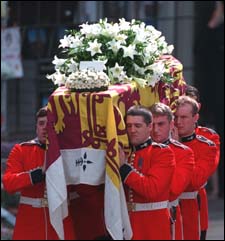A nation says goodbye
Britain buries Diana in regal ceremony
By Kevin Cullen, Globe Staff, 09/07/97
 The flower-covered hearse carrying the coffin of Princess Diana drives past some of the thousands of mourners lined up on Finchley Road in North London. (AP Photo)
The flower-covered hearse carrying the coffin of Princess Diana drives past some of the thousands of mourners lined up on Finchley Road in North London. (AP Photo)
|
 ONDON - Diana, Princess of Wales, was buried yesterday on an island at her family's country estate, carried home with a mix of the pageantry she bristled against and the common touch that fulfilled her ambition to be ''the queen in people's hearts.'' ONDON - Diana, Princess of Wales, was buried yesterday on an island at her family's country estate, carried home with a mix of the pageantry she bristled against and the common touch that fulfilled her ambition to be ''the queen in people's hearts.''
As more than 1 million people lined the sun-drenched streets of London, and an estimated 2.5 billion watched on television worldwide, Diana's funeral began at 11 a.m. and quickly became not just a religious service, but the opening salvo in a cultural war over the direction Britain's monarchy will take in the wake of her death.
Invoking his sister's rebel spirit, Earl Spencer broke tradition by using his eulogy not only to praise Diana, but to acknowledge her personal problems and to attack those who tormented her, including the royal family and the press. His eulogy was a scathing indictment of the polar ends of British society: the prying eyes of the sleazy tabloid press that put her on a pedestal, only to knock her down, and a monarchy that resisted her open desire to flout tradition and protocol.
Most of the words yesterday focused not on such recriminations, however, but on tributes. Still, Spencer's words seemed fitting for a unique funeral service that, somehow, reflected the princess herself in its simultaneous simplicity and grandeur.
The service at Westminster Abbey blended classical liturgy and pop, with a soprano singing Verdi and Elton John offering a ballad. Movie stars sat next to royals, poor people next to millionaires, the humble and the great and the good, side by side. In what police described as the biggest crowd in London since V-E day in 1945, at least 1 million people - and perhaps many times that number; the authorities said they stopped counting - watched the solemn funeral procession, then listened to the service broadcast over a public address system linked throughout the city's center.
 Pallbearers carry Princess Diana's coffin into Westminster Abbey. (AP Photo)
Pallbearers carry Princess Diana's coffin into Westminster Abbey. (AP Photo)
|
Before her casket was carried out of the abbey, the nation paused for one minute's silence. Air traffic at Heathrow Airport was held up so the quiet would be complete. With businesses closed, the country came to a virtual standstill until, after 60 seconds, the abbey's muffled bells rang out.
Diana's body was later driven 75 miles north to the English midlands, where her family has lived on the 15,000-acre Althorp House estate for more than 500 years. She was buried on an island in an ornamental lake, surrounded by trees that she and her siblings planted as children, and some oaks that her sons planted more recently.
The funeral, meanwhile, provided palpable evidence that her death has touched off a bitter debate between Diana's admirers and the royal family that forced her out last year because of her divorce from Prince Charles, and because of her outspoken opposition to the traditional role and demeanor of the monarchy.
Spencer's remarks were the clearest evidence yet that there will be a battle over whether Diana's two sons, Prince William and Prince Harry, will be allowed to bend protocol in the way that endeared their mother to the public, or will be induced to follow the strict adherence to tradition that has been preferred by their father and his mother, Queen Elizabeth II.
For his part, Spencer vowed to his dead sister that her ''blood family'' would save the boys from being emotionally suffocated by the royal family.
''We will do all we can to continue the imaginative and loving way in which you were steering these two exceptional young men so that their souls are not simply immersed by duty and tradition but can sing openly as you planned,'' Spencer said, referring to Diana's insistence that the boys attend school outside the palace walls and be exposed to experiences as mundane as eating at McDonald's or visiting a homeless shelter.
''We fully respect the heritage into which they have both been born, and will always respect and encourage them in their royal role. But we, like you, recognize the need for them to experience as many different aspects of life as possible to arm them spiritually and emotionally for the years ahead. I know you would have expected nothing less from us.''
Spencer's swipe at the monarchy was bitter and, under the circumstances, stunning. But it was well-received by many Britons. When, his voice thick with emotion, Spencer finished, there was spontaneous clapping inside the abbey - the first time, some historians said, there had been applause during a funeral in the building since it opened in 1065.
More than a mile away, in Hyde Park, where tens of thousands had gathered to sit on the grass and watch the service on huge television screens, the crowds responded to Spencer's words with a standing ovation.
While Spencer's words were enthusiastically received, some people inside the abbey, including many of the 43 members of the royal family who attended, sat stiffly, as though to demonstrate the split between traditionalists and those who want the monarchy to adopt Diana's common touch.
Spencer also took a shot at the nation's news media, which he said had not afforded his sister any privacy, and whose tabloid elements he blames for literally hounding her to death. French police say they believe photographers who chased Diana's car caused it to crash last week in Paris, killing her, her companion Dodi Fayed, and their driver, Henri Paul. Spencer had withdrawn funeral invitations extended to six tabloid editors by Buckingham Palace officials.
''Of all the ironies about Diana, perhaps the greatest was this: that a girl given the name of the ancient goddess of hunting was in the end the most hunted person of the modern age,'' Spencer said.
He cautioned people not to canonize his sister. He said she was not a saint, but a fallible and insecure human being. It was her vulnerability, he said, that endeared her to the world.
The funeral began after a 3.5-mile procession from Kensington Palace, Diana's London home, to Westminster Abbey. Her coffin was draped with the Royal Standard - the Windsor family flag - and covered by white lilies and a floral arrangement with a card that had just one word written on it: ''Mummy.''
The coffin was borne on a horse-drawn carriage. An honor guard of British soldiers, called back from Northern Ireland to serve as pallbearers, walked beside it. Mourners stood mostly in silence as it passed, while others cried or tossed flowers toward the coffin.
As the cortege passed The Mall, it was joined by the five principal mourners: Diana's two sons; her brother; Prince Charles; and his father, Philip, the Queen's husband. Representing three generations of the royal family, they walked behind the coffin for the last mile. Prince William, 15, walked with his head bowed. Prince Harry, just nine days short of his 13th birthday, stared straight ahead, his arms stiff at his side.
''Isn't Harry brave?'' a woman whispered as the cortege passed by. Those around her, some of them weeping, nodded.
Behind the principal mourners came 500 people representing the charities that Diana held dearest. One of them, 7-year-old Hollie Everson, was dying of cancer when a visit from Diana lifted her spirits; she is now in remission. Others, suffering from AIDS, leprosy, and illnesses that required them to use wheelchairs, followed the royals. It was Diana's work for, and sensitivity toward, those who were ill or marginalized that made her enormously popular with ordinary Britons.
Among the 1,900 mourners inside the abbey were some of the celebrities that Diana counted among her friends: actors Tom Cruise, his wife, Nicole Kidman, and Tom Hanks; filmmakers Steven Spielberg and Richard Attenborough; and singers George Michael and Diana Ross. Tenor Luciano Pavarotti, who had said he was too distraught to sing, appeared grief-stricken and had to be assisted into the church.
Elton John and his lyricist, Bernie Taupin, reworked the lyrics to their ode to Marilyn Monroe, ''Candle in the Wind,'' to lament the passing of ''England's Rose.'' It was the first pop song to be sung at the venerable abbey, and it brought tears to the eyes of many mourners, inside and out, royal and common.
When John sang the words, ''Your candle burned out long before your legend ever will,'' Harry reportedly buried his face in his hands and sobbed quietly. And William was said to become tearful when the pop star sang: ''All our words cannot express the joy you brought us through the years.''
After the service, Diana's coffin was driven by hearse through London on the way to the M1 highway that heads north. As the hearse turned onto the M1, the driver had to get out to remove flowers that mourners had tossed onto his windshield.
Then he climbed back in and drove on, up to Althorp, and to Diana's final resting place. There, she reportedly was buried with a rosary sent by Mother Teresa.
This story ran on page A01 of the Boston Globe on 09/07/97.
© Copyright 1997 Globe Newspaper Company.
|


![]()

![]()






 The flower-covered hearse carrying the coffin of Princess Diana drives past some of the thousands of mourners lined up on Finchley Road in North London. (AP Photo)
The flower-covered hearse carrying the coffin of Princess Diana drives past some of the thousands of mourners lined up on Finchley Road in North London. (AP Photo)
 ONDON - Diana, Princess of Wales, was buried yesterday on an island at her family's country estate, carried home with a mix of the pageantry she bristled against and the common touch that fulfilled her ambition to be ''the queen in people's hearts.''
ONDON - Diana, Princess of Wales, was buried yesterday on an island at her family's country estate, carried home with a mix of the pageantry she bristled against and the common touch that fulfilled her ambition to be ''the queen in people's hearts.'' Pallbearers carry Princess Diana's coffin into Westminster Abbey. (AP Photo)
Pallbearers carry Princess Diana's coffin into Westminster Abbey. (AP Photo)
